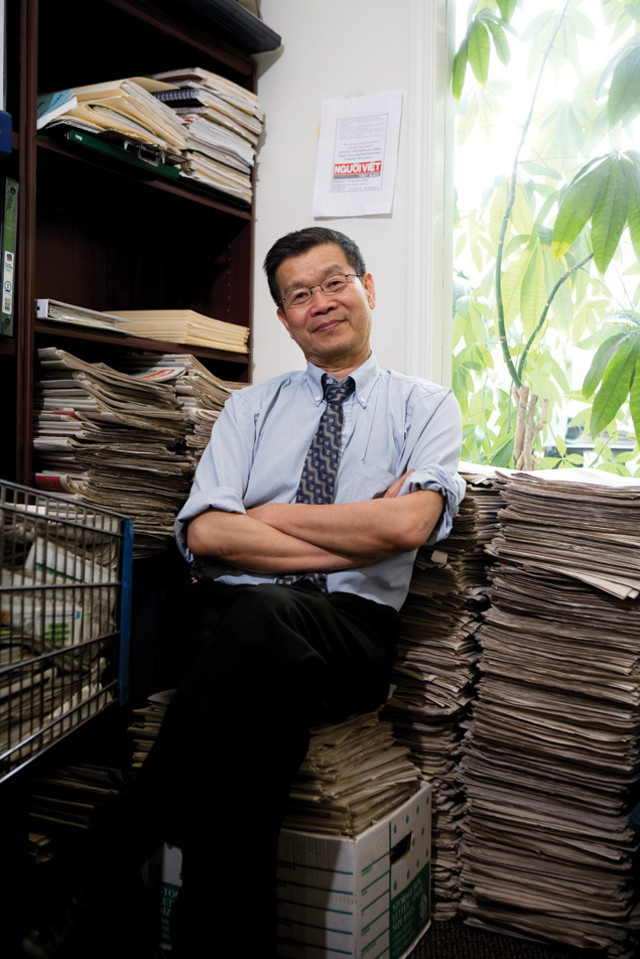Phamily Newspaper

Paper familias Kim Pham nursed the dream in a jungle prison; his kids carry it on.
Image: Lindsay Borden
THE PHAM FAMILY BUSINESS gestated more than 30 years ago in a setting that seems scarcely imaginable today. Until 1975 Kim Pham was a press officer for the South Vietnamese Navy, but he dreamed of starting his own newspaper. At war’s end he was packed off to a “reeducation camp”—a harsh jungle prison for those deemed suspect by the victorious communists. Others there shared his dream, and they imagined news features and editorial policies the way prisoners ordinarily fantasize about women.
In 1979 Kim escaped Vietnam with his wife Hang Nga and their infant daughter, and washed up in Seattle. He had a gift for design and a head for gauging costs and materials, and he found work as a marine architect at shipyards in Tacoma and Ballard. Still he dreamed of newspapering.
Daydream became moonlighting reality in 1986, when Kim and Hang Nga launched the weekly Nguoi Viet Tay Bac, aka NVTB or Northwest Vietnamese News, the region’s first privately published Vietnamese paper. Success didn’t come easy. For the first four years Kim worked till midnight at his office and print shop in the Rainier Valley, then returned at 6am to the boatyard. But NVTB prospered in its modest way, as have many immigrant community papers; the ethnic press has been hailed as a relative bright spot in the dismal news-business picture.
NVTB grew to over 100 pages of local business and political news, community announcements, digested international reports (a boon to non-English readers), how-to advice on American ways, and op-eds. (“Everyone [in the community] wants to write opinion,” says Kim’s daughter Julie Pham. “Reporting’s the hard part.”) It spun off a second weekly edition and an annual yellow pages–style Vietnamese business directory. In the early ’90s two of Kim’s fellow dreamers in the reeducation camp reached Seattle and joined the paper; they still work there today.
So do all three of Kim’s kids. The youngest, 26-year-old Don, is the political reporter and photographer. Andy, 28 and calm and methodical like his father, handles advertising and production. Julie, 30, the managing editor, is the most unexpected returnee to the family business. She’d embarked on a brilliant academic career at UC Berkeley, where she was managing editor of The Journal of Vietnamese Studies, and Cambridge, where she completed her PhD in history. But she opted to write the first draft of tomorrow’s histories rather than study yesterday’s.
Their commitment is a gratifying surprise to Kim and an exception to the familiar assimilation narrative, in which immigrants’ children shoot off on trajectories beyond their parents’ ken. And it may be the best hope for surviving the storms they all see coming.
Newspapering, the Vietnamese community, and the intersection of the two are all undergoing what Julie Pham calls “a revolution.” Times are tough for advertisers, and competition is fierce: Six newer Vietnamese weeklies of widely varying journalistic aspiration nip at NVTB ’s tail. One even adopted a similar name and a bigger sign and perched its headquarters across the King Plaza shopping center from NVTB ’s office.
The Phams fight back partly with old-fashioned journalism. “We point out—no ads on our front page,” says Julie. “Seventy percent of our first five pages is content. But it’s hard to get that across.”
The kids clamor to move into new media, to beef up their confessedly “primitive” website; Dad’s cautious. They urged killing the smaller Tuesday edition, which barely breaks even. He saved it.
Meanwhile, the Vietnamese community is undergoing a tectonic generational shift. Most of those under 30 were born here and speak little or no Vietnamese. Don speaks none, Andy learned it selling classifieds, and Julie is fluent but bemoans her “horrible American accent.” They’re trying to bridge the generational divide, inserting more English and mixed Vietlish; a feature on local rapper Nam appeared in English, just like his rhymes. They produce a cable TV show. All toward the end of making an immigrant newspaper serve a postimmigrant generation. As Julie says, “It’s a matter of family pride."




